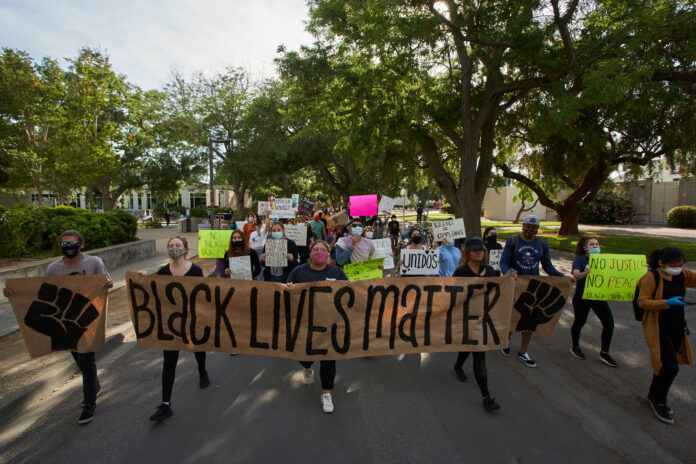Ongoing efforts toward police accountability include a task force with student input
As the trial for former Minneapolis police officer Derek Chauvin began this week, Chancellor Gary May and Vice Chancellor for Diversity, Equity and Inclusion Renetta Garrison Tull spoke to The California Aggie about UC Davis’ most recent anti-racism initiatives.
In May 2020, Chauvin was charged with the murder of George Floyd, a Black man, while on duty. The video of Chauvin kneeling on Floyd’s neck for nearly nine minutes even after Floyd expressed an inability to breathe went viral, sparking worldwide protests against racial injustice, police violence and corruption.
May’s letter to the university following Floyd’s death described the chancellor’s dismay with police violence against the Black community and exhaustion regarding his lived experiences as a Black man.
Following Floyd’s killing, UC Davis introduced several anti-racism initiatives, including the Next Generation Reforms to Advance Campus Safety Task Force.
The task force’s first report was published in December 2020 and highlighted the ongoing controversy regarding the role of police on college campuses, particularly at student protests.
It also emphasized the importance of accountability in police behavior. Student members of the task force expressed concerns regarding a lack of connection and trust between police officers and members of the UC Davis community.
They also spoke about a general fear of police, particularly among immigrant students, and a lack of transparency on the part of police officers.
According to Tull, the task force’s final report will be published in June 2021.
“We made sure people knew that there was a listening session [for the task force] and that there were no right or wrong things to say,” Tull said. “It was a qualitative process of collecting data from the campus, which includes the Police Accountability Board (PAB).”
The PAB, established in 2014, allows students, professors and staff on UC Davis’ campus to file complaints on its website should they have a negative interaction with a campus police officer.
Any identifying information is voluntary, so there is limited data available about the racial, ethnic or gender identities of the complainants, according to the most recent PAB report.
In his interview with The Aggie, May spoke of concerns raised by students regarding police activity on campus and emphasized the importance of community-based policing.
“In my mind, we actually have a fairly progressive approach to campus safety at UC Davis,” May said. “I say that pretty confidently, and I’ve been attending the seminars held by UCOP [University of California Office of the President]. It seems to me that our sister campuses might not be as far along as we are in terms of progressive policing.”
Nevertheless, advocacy groups like Cops off Campus have pushed for police officers to be removed from the UC Davis campus entirely.
May has publicly disagreed with this stance, saying that he believes Cops off Campus does not offer a constructive solution to the issues at hand.
The annual UC Davis PAB Report from the 2019-2020 school year provided data regarding policing practices on the university’s campus.
The report addressed and closed four inquiries during that time frame. These inquiries involved allegations of improper use of force, improper police procedures, dishonesty, discourtesy and improper confiscation of property.
Notably, one 26-year-old woman made allegations regarding discourtesy, intimidation and improper use of force in an interaction with campus police. However, her complaint was characterized as outside of the PAB’s purview since it was made more than 180 days following the aforementioned incident.
The PAB findings recommended that campus police officers be better trained in de-escalating challenging situations rather than simply ignoring someone’s questions, as this can aggravate the problem at hand.
They also recommended that the police force encourage officers to clarify and provide legal justification for their actions when arresting someone.
The PAB requested further information about “updated policies and training” for de-escalation techniques and cultural sensitivity.
In addition to the implementation of a task force and the continuation of the annual PAB report, the university has developed an anti-racism syllabus and curriculum.
According to Tull, the term “syllabus” broadly refers to a number of diversity-related initiatives undertaken during the 10 months since Floyd’s death. These include seminars, workshops, racial healing services, town halls and resources for racial trauma and mental health.
Currently, incoming freshmen are required to complete diversity, equity and inclusion training when they arrive at UC Davis. However, there is no mandatory anti-racism curriculum for students at the moment, May clarified.
Tull said that the Office of Diversity, Equity and Inclusion recently held a meeting about making mental health and racial trauma resources more available for students, professors and staff members who may be struggling with Derek Chauvin’s trial. The trial has featured graphic cell phone footage of Floyd’s killing and eyewitness accounts from numerous people, several of whom are underage and many of whom broke down while relating their experiences.
The Black Student Union at UC Davis said in an email that their members were unable to comment on these events. After multiple emails to ASUCD’s Ethnic and Cultural Affairs Commission, there was no response for comment.
May indicated that the university was considering offering resources specifically tailored to the issues raised by the trial of Derek Chauvin this month.
“The measures can only be reactive, because I think if there’s something that triggers a particular reaction, I want to respond to it, but I don’t want to be the trigger and have people react in an unhealthy way. We will respond appropriately to situations [as they arise],” May said.
Written by: Rebecca Bihn-Wallace — campus@theaggie.org




